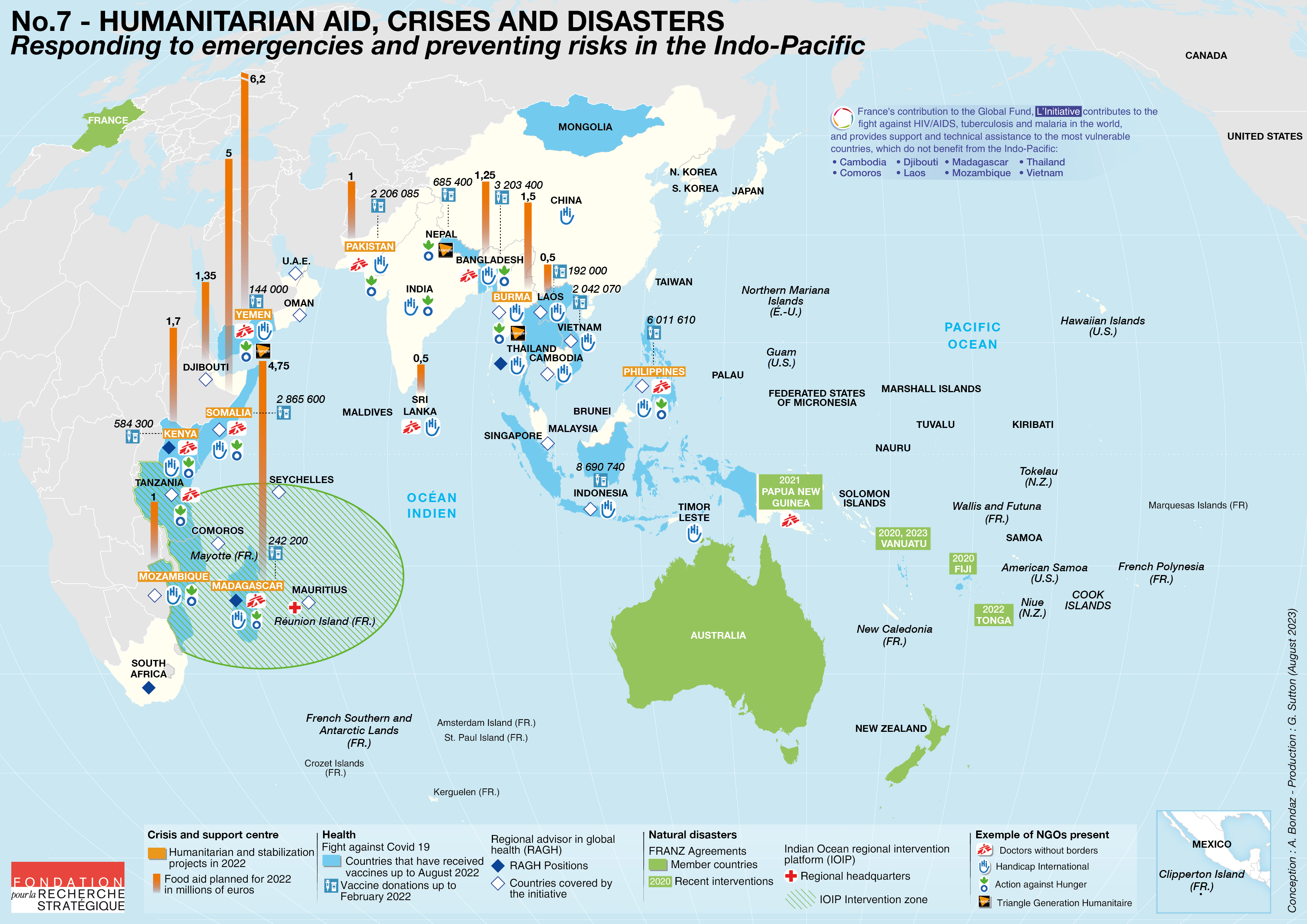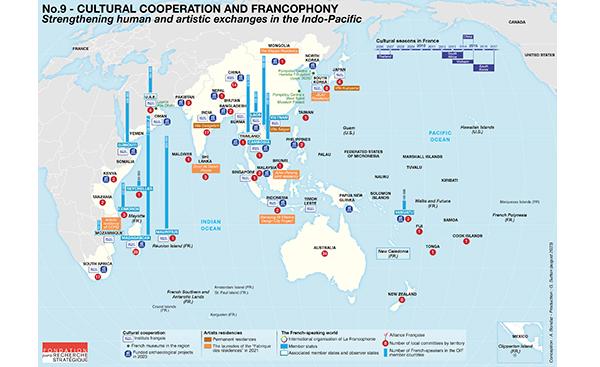Fact sheet No.7: Humanitarian aid, crises and natural disasters Responding to emergencies and preventing risks in the Indo-Pacific
Armed conflicts, fragile regimes, food crises, epidemics and natural disasters have a major impact on people in the Indo-Pacific. By the summer of 2023, the UN Office for the Coordination of Humanitarian Affairs was implementing four humanitarian response plans in the Indo-Pacific (Burma, Mozambique, Somalia and Yemen), as well as several specific plans (Horn of Africa, Kenya, Madagascar and Pakistan)UN OCHA, Global Humanitarian Overview 2023..
According to the database used by the United Nations, six of the seven countries with the highest frequency of natural disasters and the highest number of people affected over the last twenty years are in the Indo-Pacific. The region has been the source of some of the recent infectious diseases such as SARS, the Nipah virus and Covid-19.
Through multilateral initiatives, the Crisis and Support Centre (CDCS) of the Ministry of Europe and Foreign Affairs (MEAE) and numerous NGOs, France provides essential support to the people of the region and helps to prevent health crises and natural disasters.
EMERGENCY HUMANITARIAN ASSISTANCE
In the event of a crisis abroad, the CDCS ensures the protection of French nationals (see Fact sheet No.2 – Demographics and political representation) and coordinates the State’s emergency humanitarian action. Funding from the Emergency Humanitarian and Stabilisation Fund has increased fourfold in five years, enabling humanitarian and stabilisation projects to be carried out in eight Indo-Pacific countries in 2022CDCS 2022 Activity Report., and in four countries in the first semester of 2023 (Burma, Mozambique, Pakistan and Yemen).
In August 2022, exceptional aid was provided to Pakistan following the floods. The CDCS, working closely with the Ministry of the Interior’s Directorate-General for Civil Protection and Crisis Management, coordinated the operation. A special flight chartered by the Airbus Foundation transported a team of emergency doctors, survival, hygiene and protection equipment, and forty civil security rescue workers. Assistance from the European Union’s Civil Protection Mechanism (CPMU) helped to fund part of the transport and operational costs.
It is worth noting that two of the four NGOs running humanitarian projects in North Korea before the Covid pandemic were French: Première Urgence and Triangle Génération Humanitaire. The latter, which also runs projects in Burma, Nepal and Yemen, had been present in the country since 2000 and focused on two main objectives: protecting vulnerable people and improving food security, with particular attention paid to children.
FOOD AID
Programmed Food Aid (PFA) is France’s response to situations of food and nutritional insecurity; it provides funding for international organisations and NGOs. In 2022, eleven countries in the Indo-Pacific benefited from this programme, representing 20 percent of the total budget of €25 million, including Yemen (€6.2 million), Somalia (€5 million) and Madagascar (€4.8 million). France has also supported the delivery of 25,000 tonnes of Ukrainian wheat to Somalia by the World Food Programme (WFP) ship Neva in late 2022.
As part of its support for the Horn of Africa in the face of drought, the CDCS has committed exceptional funds to finance the implementation of a project by the NGO International Rescue Committee to combat food insecurity. The NGO Action against Hunger has been operating in three countries in the region: Somalia since 1991, the Philippines since 1999 and Pakistan since 2004, supporting almost 4 million people.
HEALTH CRISES
During the Covid pandemic, France mobilised considerably in the Indo-Pacific region. As early as April 2020, AFD provided a health and social response to the crisis via the “Health in Common” initiative. In particular, it supported the response plan of the Indian Ocean Commission’s regional epidemiological surveillance network, which it has been supporting since 2008. By February 2022, almost half of the 59 million doses of vaccine donated by France had been distributed to eighteen countries in the region, mainly in Indonesia and the Philippines, but also in Bangladesh and Somalia.
France supports research institutes, including the Instituts Pasteur (see Fact sheet No.11 - Scientific Cooperation and innovation), and invests in multilateral funds specialising in health. It is the largest contributor to UNITAID and a major supporter of the Global Fund to Fight AIDS, Tuberculosis and Malaria. As part of its contribution to the Global Fund, Expertise France has been implementing the Initiative since 2011, which contributes to the fight against epidemics. It is active in eight countries in the region, including Djibouti, the Comoros and Vietnam.
There are also four regional global health advisors in the Indo-Pacific region who are responsible for monitoring activities linked to these funds and health cooperation, and twenty-one countries are covered. AFD supports many health projects, such as a nearly €1 million project in Laos that aims to improve the elimination of mother-to-child transmission of HIV, hepatitis B and syphilis during prenatal care.
Of the thirty-four countries in which Médecins Sans Frontières (MSF) operated in 2022, nine were in the Indo-Pacific regionMSF 2022 Annual Report, June 2023.. The largest missions are in Yemen, Bangladesh, Pakistan and Kenya, and an exploratory mission has been launched in Sri Lanka. The projects are diverse, and include the fight against tuberculosis in Papua New Guinea, the Philippines and Somalia. Handicap International has been running humanitarian projects in nineteen countries in the region, including Cambodia since 1982 and India since 1988. In Vietnam, the Ministry of Health asked the NGO to set up the first orthopaedic workshop in Hanoi in 1989.
NATURAL DISASTERS
France is very active in humanitarian aid following natural disasters (HADR), and the French armed forces (see Fact sheet No.4 – Military presence and defence diplomacy) and civil security (see Fact sheet No.5 – Security and police cooperation) play a major role. In Southeast Asia, France is part of the Regional Coordination Centre for HADR set up in 2014 in Singapore. The FRANZ partnership with Australia and New Zealand, signed in 1992, enables emergency humanitarian aid to be delivered at the request of a South Pacific country affected by a natural disaster. More than forty operations have already been implemented, including in Vanuatu (2023 and 2020), Tonga (2022), Papua New Guinea (2021) and Fiji (2020).
In 2022, the Armed Forces in the Southern Indian Ocean (FAZSOI) delivered humanitarian aid from the Indian Ocean Regional Response Platform (PIROI) to the people of Madagascar following the cyclone Batsirai. This French Red Cross platform runs a disaster risk management programme in cooperation with national Red Cross and Red Crescent Societies. Since 2000, PIROI has carried out seventy-nine development projects and sixty-seven emergency operations.
At COP21 in 2015, France launched the CREWS initiative, which aims to build up the capacity of early warning systems for extreme weather events. Several projects have been implemented, notably in Laos, Cambodia and the Pacific. France also supports the Coalition for Disaster Resilient Infrastructure launched by India in 2019.
The French Development Agency (AFD) has been financing the HYDROMET project since 2020; it aims to strengthen meteorological, hydrological and climate services in the member countries of the Indian Ocean Commission, as well as a project to build infrastructure, provide information and monitor climate and environmental risks, and control flooding in India (see Fact sheet No.6 – Development aid and the environment).
In 2021, as part of the Support Fund for Humanitarian and Structuring Initiatives (FSIHS), the CDCS financed the disaster risk reduction project in the South Pacific of the Australian NGO Adventist Development and Relief Agency.


Fact sheet No.7: Humanitarian aid, crises and natural disasters Responding to emergencies and preventing risks in the Indo-Pacific
La France en Indo-Pacifique n°07/2023
Antoine Bondaz,
December 18, 2023






